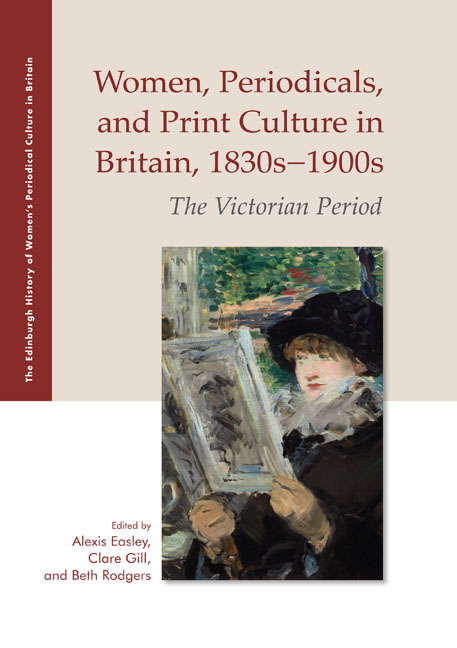Book contents
- Frontmatter
- Contents
- List of Illustrations
- Acknowledgments
- Introduction: Women, Periodicals, and Print Culture in the Victorian Period
- Part I (Re)Imagining Domestic Life
- Part II Constructing Modern Girls and Young Women
- Part III Women and Visual Culture
- Part IV Making Space for Women
- Part V Constructing Women Readers and Writers
- Part VI Intervening in Political Debates
- Intervening in Political Debates: Introduction
- 30 Brewing Storms of War, Slavery, and Imperialism: Harriet Martineau's Engagement with the Periodical Press
- 31 Mary Smith (1822–1889): A Radical Journalist under Many Guises
- 32 In Time of Disturbance: Political Dissonance and Subversion in Violet Fane's Contributions to the Lady's Realm
- 33 ‘Our Women in Journalism’: African-American Women Journalists and the Circulation of News
- 34 The Response of the Late Victorian Feminist Press to Same-Sex Desire Controversies
- 35 Wings and the Woman's Signal: Reputation and Respectability in Women's Temperance Periodicals, 1892–1899
- Notes on Contributors
- Index
- Plate section
Intervening in Political Debates: Introduction
from Part VI - Intervening in Political Debates
Published online by Cambridge University Press: 25 October 2019
- Frontmatter
- Contents
- List of Illustrations
- Acknowledgments
- Introduction: Women, Periodicals, and Print Culture in the Victorian Period
- Part I (Re)Imagining Domestic Life
- Part II Constructing Modern Girls and Young Women
- Part III Women and Visual Culture
- Part IV Making Space for Women
- Part V Constructing Women Readers and Writers
- Part VI Intervening in Political Debates
- Intervening in Political Debates: Introduction
- 30 Brewing Storms of War, Slavery, and Imperialism: Harriet Martineau's Engagement with the Periodical Press
- 31 Mary Smith (1822–1889): A Radical Journalist under Many Guises
- 32 In Time of Disturbance: Political Dissonance and Subversion in Violet Fane's Contributions to the Lady's Realm
- 33 ‘Our Women in Journalism’: African-American Women Journalists and the Circulation of News
- 34 The Response of the Late Victorian Feminist Press to Same-Sex Desire Controversies
- 35 Wings and the Woman's Signal: Reputation and Respectability in Women's Temperance Periodicals, 1892–1899
- Notes on Contributors
- Index
- Plate section
Summary
IN 1869, CHARLES KINGSLEY Wrote a review of John Stuart Mill's The Subjection of Women for Macmillan's Magazine, praising its message about women's fitness for participation in the political realm. He notes, ‘What women have done for the social reforms of the last forty years is known, or ought to be known, to all…. Who will say that Mrs Fry, or Miss Nightingale, or Miss Burdett Coutts, is not as fit to demand pledges of a candidate and the hustings on important social questions as any male elector?’ (Oct 1869: 558). In this way, he provided support for Mill's argument in favour of women's enfranchisement while at the same drawing attention to their ongoing influence in discussions of social and political questions – as recounted in and facilitated by the periodical press. Indeed, by 1869 women had been contributing to political discourse for many years, due largely to the convention of anonymity in most periodicals and newspapers. Hidden behind the ‘editorial we,’ women journalists did not have to write from gendered subject positions. The rapid expansion of the press during the same period, facilitated by advances in printing technology and reductions in the taxes on print, provided women with increased opportunities to enter the profession and contribute to political debates.
One of the most influential political journalists working in the early and mid- Victorian press was Harriet Martineau (1802–76), who began her career writing anonymous articles for the Monthly Repository (1806–37) and later published essays in the most prestigious monthlies and quarterlies of her day. She also wrote over 1,642 leaders for the London Daily News from 1852 to 1866, in addition to myriad other unsigned articles on a wide range of political and social topics, from abolition to the Woman Question. Martineau's important writings on the American Civil War and the Crimean War (1854–62) are the focus of Lesa Scholl's contribution to this volume, ‘Brewing Storms of War, Slavery, and Imperialism: Harriet Martineau's Engagement with the Periodical Press.’ Scholl argues that Martineau used these conflicts to reflect on issues of ‘human freedom and economic imperial endeavour’ (p. 490). These conflicts had implications not only for Americans and Russians but also for British readers as well – connections that she carefully highlighted in essays published in the prestigious Westminster Review (1824–1914) and Edinburgh Review (1802–1929).
- Type
- Chapter
- Information
- Women, Periodicals and Print Culture in Britain, 1830s–1900sThe Victorian Period, pp. 485 - 488Publisher: Edinburgh University PressPrint publication year: 2019



